Author Archive
Monday, January 20th, 2020
 We’ve all heard the saying “Love is in the air”! Well, WNCU would like to air your love message with our customized WNCU Cupid Gram. We’re going to use our airwaves to help you celebrate that someone special in our life. We’ve all heard the saying “Love is in the air”! Well, WNCU would like to air your love message with our customized WNCU Cupid Gram. We’re going to use our airwaves to help you celebrate that someone special in our life.
On Thursday, February 14th beginning at 7am through 7pm, WNCU host will be filling the air with your cupid gram… no long lines or shopping required!!! From the comfort of your home, you can go to our secure website or your mobile device and select the “WNCU Cupid Gram” image, choose the time and message you’d like to share with the world and we’ll handle the rest.
So, if you want to be different and do something special outside of dinner, chocolates and flowers consider sending a message via our WNCU Cupid Gram. Let the world know just how much that special someone means to you! Time is of the essence and slots are limited! So secure your WNCU Cupid Gram today! Click here.
Posted in Music News | Comments Off on Cupid Gram
Wednesday, January 1st, 2020
 An adept jazz pianist, Cyrus Chestnut balances his lithe technical skill with a robust, soulful style that speaks to his deep gospel roots and love of swinging hard bop. Having grown up playing in the church, Chestnut learned early on how to infuse his swinging, classically trained style with a warm gospel sound. It was a style he perfected in the late ’80s and early ’90s as a sideman, backing legendary vocalists Jon Hendricks and Betty Carter, as well as with instrumentalists like Donald Harrison and Wynton Marsalis. As a leader of his own groups, he has collaborated with well-respected rhythm section players including Christian McBride, Carl Allen, Clarence Penn, Ron Carter, Lewis Nash, and others. Often working in a trio, as on 2016’s Natural Essence with Buster Williams and Lenny White, or with guest artists as on 2001’s Soul Food, he displays his virtuosic skill and mastery of the jazz tradition. An adept jazz pianist, Cyrus Chestnut balances his lithe technical skill with a robust, soulful style that speaks to his deep gospel roots and love of swinging hard bop. Having grown up playing in the church, Chestnut learned early on how to infuse his swinging, classically trained style with a warm gospel sound. It was a style he perfected in the late ’80s and early ’90s as a sideman, backing legendary vocalists Jon Hendricks and Betty Carter, as well as with instrumentalists like Donald Harrison and Wynton Marsalis. As a leader of his own groups, he has collaborated with well-respected rhythm section players including Christian McBride, Carl Allen, Clarence Penn, Ron Carter, Lewis Nash, and others. Often working in a trio, as on 2016’s Natural Essence with Buster Williams and Lenny White, or with guest artists as on 2001’s Soul Food, he displays his virtuosic skill and mastery of the jazz tradition.
Born in Baltimore, Maryland in 1963, Chestnut first started playing piano at age three, and by age five was already performing at the Mount Calvary Baptist Church, which he attended with his parents. By age nine, he was studying classical piano in the prep program at the Peabody Institute. All the while, he continued to develop his gospel and jazz skills, and in 1981 enrolled at Boston’s Berklee College of Music, where he earned his degree in jazz composition and arranging. While there, he earned the Eubie Blake Fellowship, the Quincy Jones Scholarship, and the Oscar Peterson Scholarship. After graduating, he found himself an in-demand sideman, working throughout the late ’80s and early ’90s with a string of well-known performers including Jon Hendricks, Wynton Marsalis, Terence Blanchard, Donald Harrison, and others. However, it was his early association with vocalist Betty Carter, with whom he toured and recorded, appearing on 1992’s It’s Not About the Melody, that had a lasting influence on the pianist. Purportedly, Carter encouraged Chestnut to push himself to be more individualistic by taking chances and trying to surprise her.
As a leader, Chestnut took his time to develop, and made his solo debut in 1992 with The Nutman Speaks and Nut. Recorded for Japan’s Alfa Jazz label, the albums showcased the pianist’s trio with bassist Christian McBride and drummer Carl Allen. A third trio effort with McBride and Allen, Another Direction, followed on Evidence in 1993. Chestnut then signed with Atlantic and issued 1994’s Revelation with bassist Christopher J. Tomas and drummer Clarence Penn. Several more highly regarded Atlantic releases followed, including 1995’s Earth Stories and 1998’s Cyrus Chestnut, which featured guest spots from Joe Lovano, James Carter, and Anita Baker. Also during this period, he appeared on vocalist Madeleine Peyroux’s Dreamland, and collaborated on projects with other artists including Tim Warfield, Kathleen Battle, James Carter, Dee Dee Bridgewater, Rodney Whitaker, and more. He also made his acting debut, performing as a character based on Count Basie in director Robert Altman’s 1995 film Kansas City.

In 2000, Chestnut delivered his first holiday-themed album, Charlie Brown Christmas, which hit number three on the Billboard Jazz Albums chart. He then rounded out his Atlantic contract with 2001’s all-original Soul Food, a exuberant set featuring appearances by Marcus Printup, James Carter, Gary Bartz, and others. He then moved to Warner Bros. for 2003’s trio effort You Are My Sunshine, with bassist Michael Hawkins and drummer Neal Smith. He then expanded the same group to a quartet, adding guitarist Russell Malone on 2006’s Genuine Chestnut. A year later, he applied his urbane jazz chops to the music of Elvis Presley on Cyrus Plays Elvis, followed by 2008’s modal jazz-leaning Black Nile on Japan’s M&I label. In 2013, he delivered the hard bop-infused Soul Brother Cool, which featured trumpeter Freddie Hendrix. He then showcased his trio on the 2014 concert album Midnight Melodies, recorded live at Smoke in New York City. Also in 2014, he joined Jimmy Greene on the saxophonist’s poignant, Grammy-nominated album Beautiful Life.
Chestnut then moved to HighNote, debuting for the label with the 2015 trio effort A Million Colors in Your Mind, with bassist David Williams and drummer Victor Lewis. For his second HighNote effort, 2016’s Natural Essence, the pianist was joined by the veteran rhythm section of bassist Buster Williams and drummer Lenny White. Williams and White were also on board for 2017’s There’s a Sweet Sweet Spirit, which also featured vibraphonist Steve Nelson. Also that year, he paired with Charnett Moffett on the bassist’s Music from Our Soul. In 2018, Chestnut returned with Kaleidoscope, a classical-influenced trio album featuring bassist Eric Wheeler and drummer Chris Beck. Included on the album were jazz reworkings of compositions by Wolfgang Amadeus Mozart, Claude Debussy, Erik Satie, and more.
Biography written by Matt Collar & originally published at www.allmusic.com.
Photo credits:
- Homepage – jazztimes.com
- Above #1 – photos.allaboutjazz.com
- Above #2 – timeout.com
Posted in Artist of the Month | Comments Off on Cyrus Chestnut
Wednesday, December 4th, 2019
 Cassandra Wilson is an American jazz musician, vocalist, songwriter, and producer from Jackson, Mississippi. Described by critic Gary Giddins as “a singer blessed with an unmistakable timbre and attack who has expanded the playing field” by incorporating blues, country and folk music into her work. Cassandra Wilson is an American jazz musician, vocalist, songwriter, and producer from Jackson, Mississippi. Described by critic Gary Giddins as “a singer blessed with an unmistakable timbre and attack who has expanded the playing field” by incorporating blues, country and folk music into her work.
She began playing piano at six, guitar by the age of twelve and was working as a vocalist by the mid-’70s, singing a wide variety of material. After moving to New York City in the early 80’s, Cassandra met saxophonist Steve Coleman and became one of the founding members of the M-Base Collective.
At the completion of her stint with M-Base, Cassandra sought a more acoustic context for her vocal expression. She signed with Blue Note Records in 1992 and released a landmark album titled “Blue Light ‘Til Dawn” which would pave the way for a new generation of jazz singers seeking an approach and repertoire that challenged the supremacy of the American Standard songbook.
Wilson has continued interpreting in fresh and creative ways jazz, vintage blues, country and folk music up until the present day. Her awards include: two Grammys, the Django D’Or, The Edison Music Award, and a marker on the Mississippi Blues Trail. She also performed one of the leading roles in Wynton Marsalis’ “Blood on the Fields,” the first jazz work to receive a Pulitzer Prize.
In 2015, Cassandra Wilson joined forces with the prestigious label, Legacy, a subsidiary of Sony Music. Her latest project, Coming Forth By Day, was released on the 100th anniversary of Billie Holiday’s birth – April 7, 2015.
Wilson has recently launched a new site called reallycassandraradio.com to develop a more direct relationship with her audience. A section of the site, Secret Garden, is specifically designed for listeners who would like to access selections from her published and unpublished catalogue. The next project, Jupiter Rising, will be available for download in December 2019.
Originally published at cassandrawilson.com
Photo credit: cassandrawilson.com
Posted in Artist of the Month | Comments Off on Cassandra Wilson
Friday, November 1st, 2019
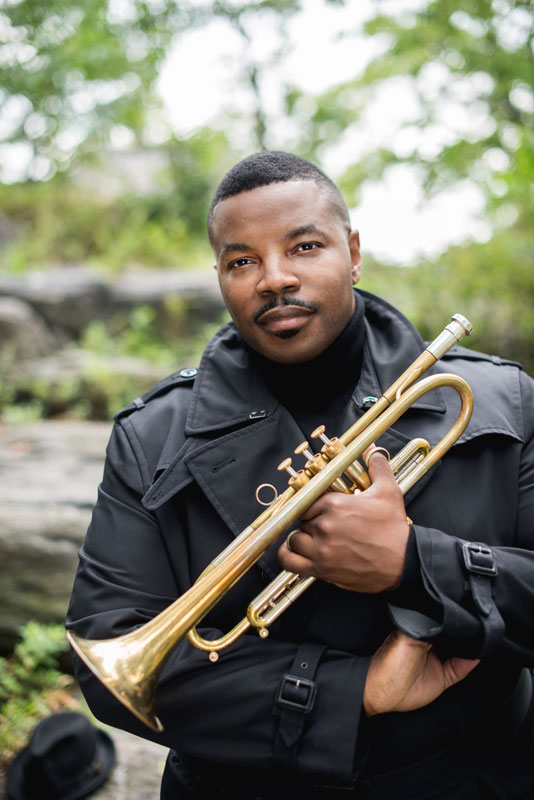 Jeremy Pelt has become one of the preeminent young trumpeters within the world of jazz. Forging a bond with the Mingus Big Band very early on, as his career progressed, Pelt built upon these relationships and many others which eventually lead to collaborations with some of the genre’s greatest masters. These projects include performances and recordings with Cliff Barbaro, Keter Betts, Bobby “Blue” Bland, Ravi Coltrane, Frank Foster, Winard Harper, Jimmy Heath, Vincent Herring, John Hicks, Charli Persip, Ralph Peterson, Lonnie Plaxico, Bobby Short, Cedar Walton, Frank Wess, Nancy Wilson and The Skatalites, to name a few. Jeremy Pelt has become one of the preeminent young trumpeters within the world of jazz. Forging a bond with the Mingus Big Band very early on, as his career progressed, Pelt built upon these relationships and many others which eventually lead to collaborations with some of the genre’s greatest masters. These projects include performances and recordings with Cliff Barbaro, Keter Betts, Bobby “Blue” Bland, Ravi Coltrane, Frank Foster, Winard Harper, Jimmy Heath, Vincent Herring, John Hicks, Charli Persip, Ralph Peterson, Lonnie Plaxico, Bobby Short, Cedar Walton, Frank Wess, Nancy Wilson and The Skatalites, to name a few.
Pelt frequently performs alongside such notable ensembles as the Roy Hargrove Big Band, The Village Vanguard Orchestra and the Duke Ellington Big Band, and is a member of the Lewis Nash Septet and The Cannonball Adderley Legacy Band featuring Louis Hayes. As a leader, Pelt has recorded ten albums and has toured globally with his various ensembles, appearing at many major jazz festivals and concert venues.
Pelt’s recordings and performances have earned him critical acclaim, both nationally and internationally. He has been featured in the Wall Street Journal by legendary jazz writer and producer, Nat Hentoff, and was voted Rising Star on the trumpet, five years in a row by Downbeat Magazine and the Jazz Journalist Association. Pelt is currently touring throughout the United States and Europe in support of his latest release, “Make Noise!” (Highnote rec. 2017).
Originally published at jeremypelt.net
Photo credits: jeremypelt.net
Posted in Artist of the Month | Comments Off on Jeremy Pelt
Tuesday, October 1st, 2019
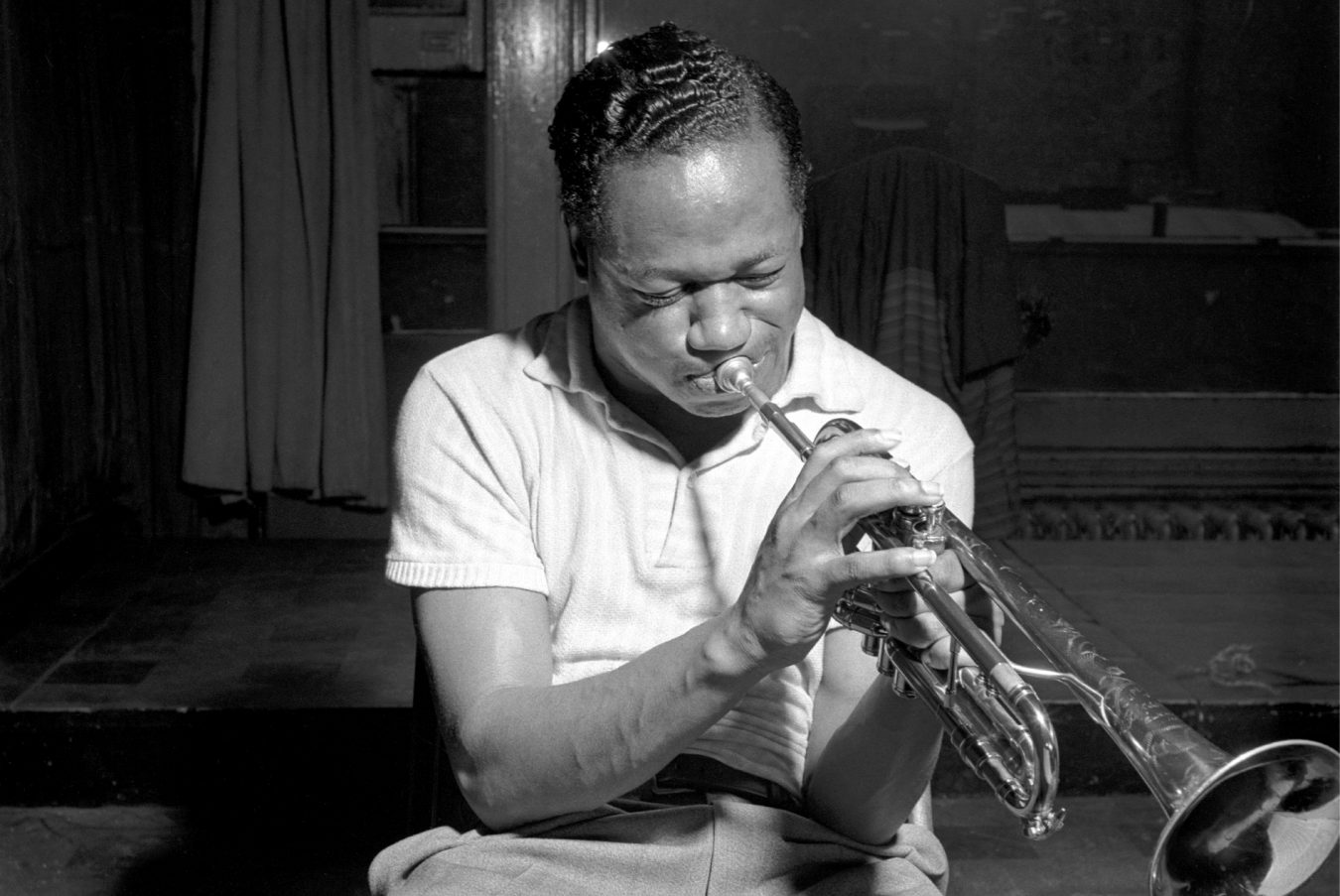 Clifford Brown’s death in a car accident at the age of 25 was one of the great tragedies in jazz history. Already ranking with Dizzy Gillespie and Miles Davis as one of the top trumpeters in jazz, Brownie was still improving in 1956. Plus he was a clean liver and was not even driving; the up-and-coming pianist Richie Powell and his wife (who was driving) also perished in the crash. Clifford Brown’s death in a car accident at the age of 25 was one of the great tragedies in jazz history. Already ranking with Dizzy Gillespie and Miles Davis as one of the top trumpeters in jazz, Brownie was still improving in 1956. Plus he was a clean liver and was not even driving; the up-and-coming pianist Richie Powell and his wife (who was driving) also perished in the crash.
Clifford Brown accomplished a great deal in the short time he had. He started on trumpet when he was 15, and by 1948 was playing regularly in Philadelphia. Fats Navarro, who was his main influence, encouraged Brown, as did Charlie Parker and Dizzy Gillespie. After a year at Maryland State University, he was in a serious car accident in June 1950 that put him out of action for a year. In 1952, Brown made his recording debut with Chris Powell’s Blue Flames (an R&B group). The following year, he spent some time with Tadd Dameron, and from August to December was with Lionel Hampton’s band, touring Europe and leading some recording sessions. In early 1954, he recorded some brilliant solos at Birdland with Art Blakey’s quintet (a band that directly preceded the Jazz Messengers) and by  mid-year had formed a quintet with Max Roach. Considered one of the premiere hard bop bands, the group lasted until Brown’s death, featuring Harold Land (and later Sonny Rollins) on tenor and recording several superb sets for Emarcy. Just hours before his death, Brownie appeared at a Philadelphia jam session that was miraculously recorded, and played some of the finest music of his short life. mid-year had formed a quintet with Max Roach. Considered one of the premiere hard bop bands, the group lasted until Brown’s death, featuring Harold Land (and later Sonny Rollins) on tenor and recording several superb sets for Emarcy. Just hours before his death, Brownie appeared at a Philadelphia jam session that was miraculously recorded, and played some of the finest music of his short life.
Clifford Brown had a fat warm tone, a bop-ish style quite reminiscent of the equally ill-fated Fats Navarro, and a mature improvising approach; he was as inventive on melodic ballads as he was on rapid jams. Amazingly enough, a filmed appearance of him playing two songs in 1955 on a Soupy Sales variety show turned up after being lost for 40 years, the only known footage of the great trumpeter. Fortunately, virtually all of his recordings are currently available, including his Prestige dates (in the OJC series), his work for Blue Note and Pacific Jazz (on a four-CD set), and his many Emarcy sessions (reissued on a magnificent ten-disc set). But the one to pick up first is Columbia’s The Beginning and the End, which has Brown’s first and last recordings.
Originally published at allmusic.com
Photo credits:
- Home – britannica.com
- Above #1 – jazziz.com
- Above #2 – britannica.com
Posted in Artist of the Month | Comments Off on Clifford Brown
Sunday, September 1st, 2019
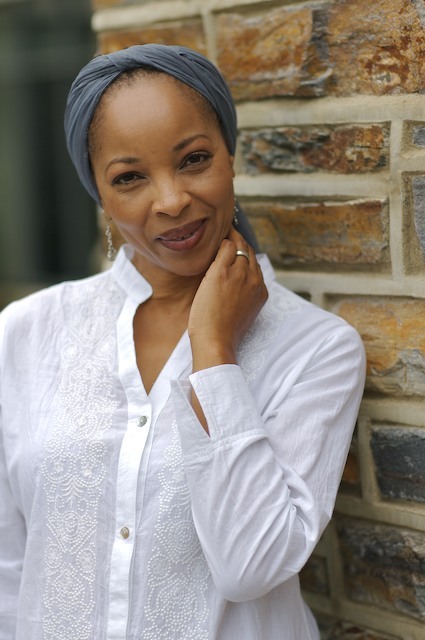 Lois Deloatch Gomes’ career spans nearly three decades in the arts, education and philanthropy. Noted for her rich contralto voice, compelling songwriting, and sophisticated humor, Lois has appeared in concert throughout the United States and internationally, written and lectured on jazz, arts and culture, and co-hosted a radio show. She has produced five recordings as leader: Roots: Jazz/Blues/Spirituals (2010), Closure (2005), Holy Night (2004), Sunrise (1998) and Hymn to Freedom: Homage to Oscar Peterson (2008), which garnered international accolades including selection as one of the Top 10 CDs of 2008 by JazzTimes Magazine’s music critic Owen Cordle. Lois Deloatch Gomes’ career spans nearly three decades in the arts, education and philanthropy. Noted for her rich contralto voice, compelling songwriting, and sophisticated humor, Lois has appeared in concert throughout the United States and internationally, written and lectured on jazz, arts and culture, and co-hosted a radio show. She has produced five recordings as leader: Roots: Jazz/Blues/Spirituals (2010), Closure (2005), Holy Night (2004), Sunrise (1998) and Hymn to Freedom: Homage to Oscar Peterson (2008), which garnered international accolades including selection as one of the Top 10 CDs of 2008 by JazzTimes Magazine’s music critic Owen Cordle.
Her concerts, lectures, and workshops skillfully integrate various musical styles ranging from traditional blues to contemporary jazz compositions. She shared the stage with legendary musicians such as pianist Ellis Marsalis and drummer Ed Thigpen as well as emerging stars.

Often defying genre and category, Lois uses her art to convey ideas, provoke thought and engage audiences. Her performances, writing, and recordings are “courageous and emotional.” A poet and singer since her youth, Lois was nurtured and inspired by her rural, southern upbringing and, over the years, has expanded her artistic pursuits and perspectives with the support of her ever-growing circle of friends and fans around the globe. Collaborating across art forms, Lois works with dancers, visual artists, filmmakers, authors, scholars, and others to conceive and create innovative works.
Lois earned a Bachelor of Arts from UNC–Chapel Hill and the Masters of Arts from Duke University. She has received numerous awards and honors for her musicianship and community service. Among her affiliations, she is a member of the National Academy of Recording Artists and the African American Jazz Caucus. She also has had a notable career as a fundraiser, philanthropy adviser and administrator.
Originally published at www.loisgomes.com
Photo credits: www.loisgomes.com
Posted in Artist of the Month | Comments Off on Lois Deloatch Gomes
Thursday, August 1st, 2019
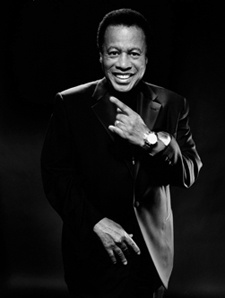 Wayne Shorter was born on Aug. 25, 1933, in Newark, New Jersey. He is simply one of the great legends of jazz. He has been one of the leading tenor and soprano saxophonists for almost the past 40 years. He is one of the finest composers that jazz has ever known. His work as a leader for Blue Note Records, as well as his work with the Miles Davis second classic quintet in the 1960’s, may be one of the finest and most productive ten-year stretches in the history of jazz, or modern music. Wayne Shorter was born on Aug. 25, 1933, in Newark, New Jersey. He is simply one of the great legends of jazz. He has been one of the leading tenor and soprano saxophonists for almost the past 40 years. He is one of the finest composers that jazz has ever known. His work as a leader for Blue Note Records, as well as his work with the Miles Davis second classic quintet in the 1960’s, may be one of the finest and most productive ten-year stretches in the history of jazz, or modern music.
He attended Music and Arts High School in Newark, and graduated as an art major; his music interests were limited in those days. Near the end of his high school career he picked up a saxophone, and with the encouragement of his father, began to play. Upon graduation from NYU in 1956 he was drafted and served in the U.S. Army until 1958. During his stint in the army he was able to play a three-night gig in Philadelphia with Horace Silver’s Quintet. After his discharge from the army, he was back in New York and played a short time with Maynard Ferguson. It was here that he met pianist Joe Zawinul.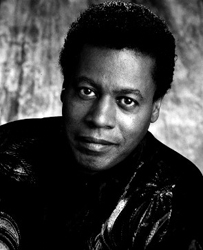
Shorter’s improvising was always notable for its great harmonic and rhythmic sophistication. His early tenor saxophone solos, inspired by Sonny Rollins, featured rare formal unity using thematic improvisation techniques, often with drama and humour (“Afrique,” “High Modes”). Shorter wrote many of his finest songs for the Blakey and Davis groups, including “Lester Left Town,” “Ping Pong,” “Children of the Night,” and “Footprints.” Shorter joined Art Blakey’s Jazz Messengers in 1959 and was with them until 1963. During his stint with the Messengers he was joined by trumpeter Lee Morgan, pianist Bobby Timmons, bassist Jymie Merritt, and Blakey. During this time with the Messengers he also became the “musical director” of the band, as had Horace Silver and Benny Golson before him. It was also during this time that he made his first recordings as a leader on the Chicago-based Vee-Jay label.
The year 1964 was a giant year in Shorter’s career. He made his debut as a leader on Blue Note Records (Night Dreamer), and joined the Miles Davis Quintet in place of the 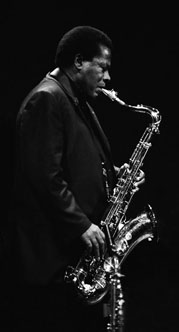 departed John Coltrane. This had to be a bittersweet experience for Shorter, replacing one of the men whom he cites as a major influence on his playing style. When Shorter joined the Miles Davis Quintet, Davis would later write, ‘when he (Shorter) came into the band it started to grow a lot more, and a whole lot faster, because Wayne is a real composer. He writes scores, write the parts for everybody just as he wants them to sound. He also brought in a kind of curiosity about working with musical rules. departed John Coltrane. This had to be a bittersweet experience for Shorter, replacing one of the men whom he cites as a major influence on his playing style. When Shorter joined the Miles Davis Quintet, Davis would later write, ‘when he (Shorter) came into the band it started to grow a lot more, and a whole lot faster, because Wayne is a real composer. He writes scores, write the parts for everybody just as he wants them to sound. He also brought in a kind of curiosity about working with musical rules.
After three routine Columbia albums during 1986, and a tour with Santana, he lapsed into silence, finally emerging in 1992 with Wallace Roney and the V.S.O.P. Rhythm Section in the “A Tribute to Miles” band. In 1994, now on Verve, Shorter released “High Life,” a somewhat more engaging collaboration with keyboardist Rachel Z. In concert, he has fielded an erratic series of bands, which could be incoherent one year (1995), and lean and fit the next (1996). He guested on the Rolling Stones’ Bridges to Babylon in 1997 and on Herbie Hancock’s Gershwin’s World in 1998. In 2001, he was back with Herbie for “Future 2 Future” and on Marcus Miller’s “M2.” The year 2002 saw the release of “Footprints Live” under his own name, followed by “Alegria” in 2003. Given his long track record, Shorter’s every record and appearances are still eagerly awaited by fans in the hope that he will thrill them again.
Posted in Artist of the Month | Comments Off on Wayne Shorter
Tuesday, July 9th, 2019

Delfeayo Marsalis (pronounced DEL-fee oh) is one of the top trombonists, composers and producers in jazz today. Known for his “technical excellence, inventive mind and frequent touches of humor…” (Leonard Feather, Los Angeles Times), he is “…one of the best, most imaginative and musical of the trombonists of his generation.” (Philip Elwood, San Francisco Examiner.) In January 2011, Delfeayo and the Marsalis family (father Ellis and brothers Branford, Wynton and Jason) earned the nation’s highest jazz honor – a National Endowment for the Arts Jazz Masters Award.
Born in New Orleans on July 28, 1965, Marsalis was destined to a life in music. “I remember my dad (Ellis Marsalis) playing piano at the house, and me laying underneath the piano as a child, listening to him play. After briefly trying bass and drums, in sixth grade I gravitated towards the trombone, which was an extension of my personality. .” Early influences included J.J. Johnson, Curtis Fuller, Al Grey, Tyree Glenn, Tommy Dorsey and Ellington’s trombone masters. Marsalis attended the New Orleans Center for Creative Arts high school, was classically trained at the Eastern Music Festival and Tanglewood Institute, and majored in both performance and audio production at Berklee College of Music. He earned a Masters degree in jazz performance at the University of Louisville and was conferred a doctorate by New England College.
About the time that he first started playing trombone, Marsalis was already greatly interested in the recording process. “Branford showed me how to create a feedback loop on a reel to reel machine and I was hooked! When I was in seventh grade, Wynton challenged me to create home recordings of him that had the same quality as trumpet virtuoso Maurice Andre’s classical studio recordings. It was all trial and error and I discovered a process and logic that I still use while recording today.” Delfeayo recorded demo tapes for his brothers and schoolmates and served an internship at (pianist Allen Toussaint’s) Sea Saint Studio.

From the age of 17 until the present, he has produced over 100 recordings for major artists including Harry Connick, Jr, Spike Lee, Terence Blanchard, the Preservation Hall Jazz Band and his father and brothers. Marsalis is an exceptional trombonist who has toured internationally with his own groups, as well as those led by five renowned bandleaders. “Art Blakey taught me patience and purpose in soloing; Abdullah Ibrahim’s sense of harmony is prevalent in much of my music; Slide Hampton inspired me with his extraordinary command of the trombone and the language of jazz; and Max Roach played with conviction and dexterity all the time. Elvin Jones (who is featured on Delfeayo’s 2006 CD Minions Dominion) taught me about humanity, expressing myself through music, and most importantly, how to keep time.” The lessons of these legendary artists can be heard throughout Delfeayo’s compositions and improvisations still today. As a composer and arranger, Delfeayo has always shown a flair for the dramatic. His debut CD Pontius Pilate’s Decision (1992) was inspired by biblical tales, and 2010’s stunning Sweet Thunder gives the Duke Ellington/Billy Strayhorn suite Such Sweet Thunder a modern day makeover.
Rather than merely recreating the classic work, which is comprised of musical depictions of characters from William Shakespeare’s plays, Marsalis took the work as a point of departure for his octet, creating fresh and new music with inspired performances. Sweet Thunder earned a place on numerous top CDs of the year lists and wide critical acclaim including 4 stars in USA Today and 5 stars in the Financial Times. Marsalis also created an original theatrical jazz production, Sweet Thunder: Duke & Shak, which toured widely in 2011.
He recently served as Music Producer for the upcoming film Bolden!, a mythical account of the life of Buddy Bolden, the first Cornet King of New Orleans. Among Delfeayo’s six CDs as a leader are the 1997 quintet date Musashi, which was praised by the All Music Guide for its “passionate originals… willingness to take chances and stretch himself and the result is consistently stirring post-bop music.” The Last Southern Gentlemen (2014) is his first album-length collaboration with his father, Ellis.
Incorporating Delfeayo’s writings—including an essay on the sociological/historical themes that define the recording, commentary on the music, and original stories, children’s tales and poetry—The Last Southern Gentlemen saw New Orleans jazz royalty combine for an album of swinging playing and sociological heft. The CD earned rave reviews including 4.5 stars from Monarch Magazine. As Jennifer Odell writes in DownBeat, “Throughout the album, the performers prioritize warmth, tranquility and restraint while imbuing melodies and solos with the lyrical sentiments at the heart of the original music.” And Marc Myers of JazzWax writes, “Marsalis exhibits a beautiful tone throughout as he’s accompanied by his father and pianist Ellis Marsalis, bassist John Clayton and drummer Marvin “Smitty” Smith. A contemplative, embracing release from top to bottom.”
Marsalis has also been long involved in work as an educator. To inspire New Orleans youth through arts education, Delfeayo founded the Uptown Music Theatre in 2000 and has implemented its Kidstown After School in three New Orleans grammar schools. Delfeayo released Live at Jazz Fest 2011 with The Uptown Jazz Orchestra, and in 2014, he took the group to Africa to perform at the Standard Bank Joy of Jazz event. In addition, he has composed over 80 songs that help introduce kids to jazz through musical theatre and has reached over 5,000 students nationally with his Swinging with the Cool School soft introduction to jazz workshops.
Originally published at www.dmarsalis.com
Photo credits:
- Home – www.offbeat.com
- Above #1 – www.dmarsalis.com
- Above #2 – www.enjoymagazine.net
Posted in Artist of the Month | Comments Off on Delfeayo Marsalis
Saturday, June 1st, 2019
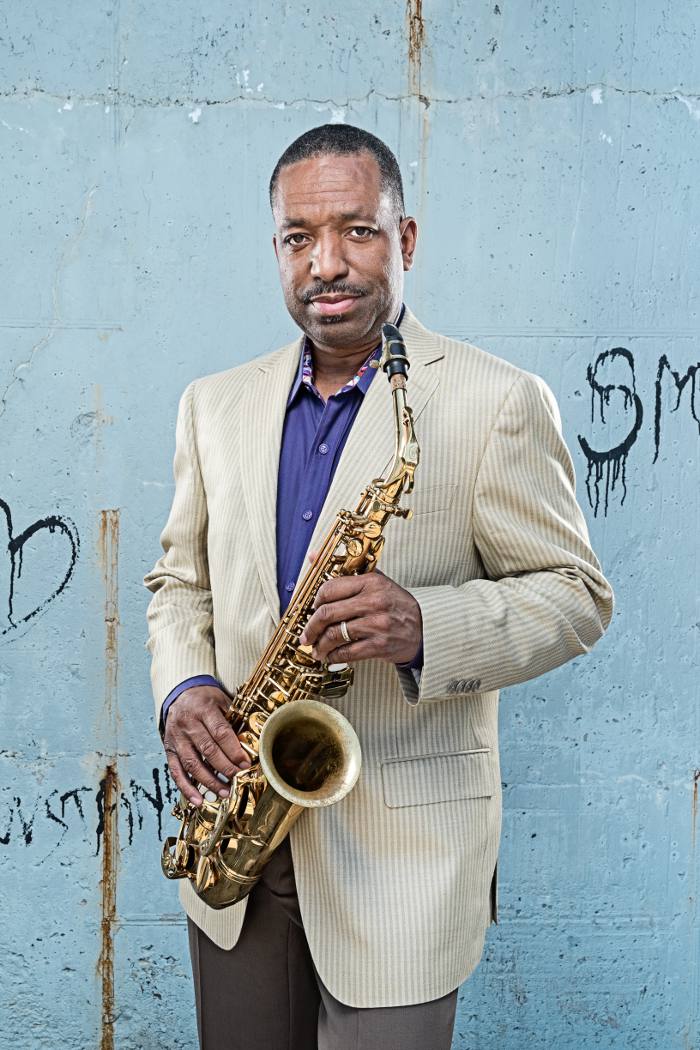 Donald Harrison was born in New Orleans in 1960 and grew up in a home environment saturated with the city’s traditional brass bands, afro-new Orleans culture, modern jazz, R&B, funk, classical, world and dance music. His connection to New Orleans’ roots was deepened by his father, a Big Chief, in a new American style of African culture developed in New Orleans. The culture is an offshoot culture of Congo Square, one of the only known places in North America where Africans openly participated in their culture in the 18th and 19th centuries and still participate in it throughout the city. Donald became the Big Chief of The Congo Square Nation Afro-New Orleans cultural group in 1999 and coined the term Afro-New Orleans to describe his culture. He designed and built New Orleans’ first cultural attire to merge African designs with Afro-New Orleans style cultural designs. Donald Harrison was born in New Orleans in 1960 and grew up in a home environment saturated with the city’s traditional brass bands, afro-new Orleans culture, modern jazz, R&B, funk, classical, world and dance music. His connection to New Orleans’ roots was deepened by his father, a Big Chief, in a new American style of African culture developed in New Orleans. The culture is an offshoot culture of Congo Square, one of the only known places in North America where Africans openly participated in their culture in the 18th and 19th centuries and still participate in it throughout the city. Donald became the Big Chief of The Congo Square Nation Afro-New Orleans cultural group in 1999 and coined the term Afro-New Orleans to describe his culture. He designed and built New Orleans’ first cultural attire to merge African designs with Afro-New Orleans style cultural designs.
Harrison created “Nouveau Swing,” a style off jazz that merges it with modern dance music like R&B, Hip-Hop, Soul and Rock. Over twenty years ago, he also combined jazz with Afro-New Orleans traditional music on his critically acclaimed and influential albums “Indian Blues” in 1991 and “Spirits of Congo Square” in 2000. These records deepened his commitment to maintaining the offshoot rituals, call and response chants and drumming as well as his determination to keep traditional to modern jazz music alive for the next generation.
Over three decades playing as a professional artist has placed Harrison on stage and on recordings with some of the most influential artists of the 21st century. He has performed and recorded with an illustrious list of distinguished musicians in Jazz, R & B, Funk, Classical and other music genres. Art Blakey, Roy Haynes, The Cookers, McCoy Tyner, Miles Davis, Lena Horne, Ron Carter, Billy Cobham, Eddie Palmieri, Jennifer Holiday, Dr. John, Guru’s Jazzmatazz, McCoy Tyner, Dr. Lonnie Smith, Digable Planets, Notorious BIG, The Chicago Symphony Orchestra and The Louisiana Philharmonic Orchestra are just a few of the artists and ensembles he has performed with.
As an actual evacuee/survivor of Hurricane Katrina, Harrison had a prominent role in Spike Lee’s HBO documentary, “When the Levees Broke.” He also appeared as himself and co-wrote the sound track for Academy Award winning Director Jonathan Demme’s feature film, “Rachel’s Getting Married,” starring Anne Hathaway and Debra Winger. Aspects of Harrison’s life and music are chronicled with two characters in David Simon’s ground breaking HBO series, Treme. He was a character consultant and appeared as himself in eleven episodes in the series.
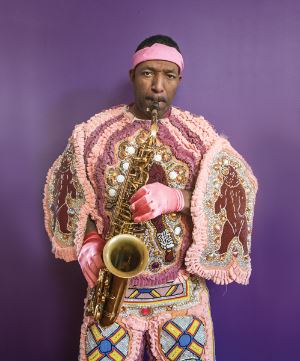
Harrison recorded “Quantum Leap” in 2012, which musicians and critics agree is a next step for real jazz and is an amalgamation of his life’s experiences and years playing with jazz masters. With quantum jazz, Donald has opened up new areas for time, harmony, and melody. The recording has another component where it melds cutting edge jazz with New Orleans funk, connecting the past with the present with jazz music that transcends boundaries. His upcoming jazz recording will feature, Dr. Lonnie Smith, Christian Scott, Max Moran, Detroit Brooks, Joe Dyson and others. The recording has Donald Harrison playing sax, singing, rapping, chanting, playing percussion, piano, keyboards, drumming and producing.
In October 2015, Harrison explored a new chapter on his musical path when he recorded his first classical orchestral composition, “Congo Square Part I”, with the Moscow Symphony Orchestra. The work is composed and orchestrated by the jazz saxophonist as a purely classical composition. Harrison plans to do other parts with his orchestral piece that will open up other ways to think of what music can be as a whole.
Harrison is co-founder and Artistic Director of the Tipitana’s Intern Program and also the founder of The New Jazz School where he along with his hand picked staff of seasoned veterans teach jazz, soul, funk, theory, harmony, composition, and history to students ranging from ages thirteen to eighteen. The Tip’s program is a college preparatory and music-training program for junior and senior high school students. This program has afforded millions of dollars in scholarships for its students, has taught million dollar-selling producers, and has placed many prominent musicians in the professional ranks. Trumpeter Christian Scott, hip hop icon The Notorious B.I.G., trombonist Trombone Shorty, guitarist Josh Connelly, producer Deezle and saxophonists Louis Fouche, Chris Royal and Aaron Fletcher are just a few. His working groups are an incubator for jazz bandleaders such as Christian Scott, guitarist Mark Whitfield, pianist Cyrus Chestnut and bassists Christian McBride and Esperansa Spalding.
Throughout his career, Harrison has received numerous accolades for his music and talent. He is a patented inventor whose main invention is a new system to record and play back music. His new system will give musicians and music lover’s new ways to engage with music. He is working on developing software for the invention, which many believe, will assist in turning around a sagging music industry. Some of his awards include: two of France’s “Grand Prix du Disque”, Switzerland’s “The Ascona Award”, Japan’s Swing Journal “Alto Saxophonist of the Year,” The Jazz Journalist Association’s “A List Award,” 2012 New Orleans Civic Award, 2007 Jazziz Magazine’s “Person of the Year,” the Big Easy Music Awards “Ambassador of Music” and a Down Beat Magazine’s Alto Saxophone Poll Winner. He was also a 2006 Resident at William and Mary College, a 1995 “Meet The Composer” recipient and a 2012 Grammy nominee.
Originally published at www.donaldharrison.com
Photo credit:
- Homepage photo: www.jazztimes.com
- Photo #1 above: www.thecookersmusic.com
- Photo #2 above: www.offbeat.com
Posted in Artist of the Month | Comments Off on Donald Harrison
Saturday, May 4th, 2019
 To say that Mary Lou Williams had a long and productive career is an understatement. Although for decades she was often called jazz’s greatest female musician (and one has to admire what must have been a nonstop battle against sexism), she would have been considered a major artist no matter what her sex. To say that Mary Lou Williams had a long and productive career is an understatement. Although for decades she was often called jazz’s greatest female musician (and one has to admire what must have been a nonstop battle against sexism), she would have been considered a major artist no matter what her sex.
Just the fact that Williams and Duke Ellington were virtually the only stride pianists to modernize their style through the years would have been enough to guarantee her a place in jazz history books. Williams managed to always sound modern during a half-century career without forgetting her roots or how to play in the older styles.
Born Mary Elfrieda Scruggs (although she soon took the name of her stepfather and was known as Mary Lou Burley), she taught herself the piano by ear and was playing in public at the age of six. Growing up in Pittsburgh, Williams’ life was always filled with music. When she was 13, she started working in vaudeville, and three years later married saxophonist John Williams. They moved to Memphis, and she made her debut on records with Synco Jazzers. John soon joined Andy Kirk’s orchestra, which was based in Kansas City, in 1929. Williams wrote arrangements for the band, filled in for an absent pianist on Kirk’s first recording session, and eventually became a member of the orchestra herself. Her arrangements were largely responsible for the band’s distinctive sound and eventual success. Williams was soon recognized as Kirk’s top soloist, a stride pianist who impressed everyone (even Jelly Roll Morton). In addition, she wrote such songs such as “Roll ‘Em” (a killer hit for Benny Goodman) and “What’s Your Story Morning Glory” and contributed arrangements to other big bands, including those of Goodman, Earl Hines, and Tommy Dorsey. Her arrangements were largely responsible for the band’s distinctive sound and eventual success. Williams was soon recognized as Kirk’s top soloist, a stride pianist who impressed everyone (even Jelly Roll Morton). In addition, she wrote such songs such as “Roll ‘Em” (a killer hit for Benny Goodman) and “What’s Your Story Morning Glory” and contributed arrangements to other big bands, including those of Goodman, Earl Hines, and Tommy Dorsey.
Mary Lou Williams stayed with Kirk until 1942, by which time she had divorced John Williams and married trumpeter Harold “Shorty” Baker. She co-led a combo with Baker before he joined Duke Ellington. Williams did some writing for Duke (most notably her rearrangement of “Blue Skies” into a horn battle called “Trumpets No End”) and played briefly with Benny Goodman’s bebop group in 1948. She had gradually modernized her style and by the early to mid-’40s was actively encouraging the young modernists who would lead the bebop revolution, including Thelonious Monk, Bud Powell, Tadd Dameron, and Dizzy Gillespie. Williams’ “Zodiac Suite” showed off some of her modern ideas, and her “In the Land of Oo-Bla-Dee” was a bebop fable recorded by Gillespie.
Williams lived in Europe from 1952-1954 and then became very involved in the Catholic religion. She retired from music for a few years before appearing as a guest with Dizzy Gillespie’s orchestra at the 1957 Newport Jazz Festival. Williams returned to jazz and by the early ’70s sounded more like a young modal player (clearly she was familiar with McCoy Tyner) than a survivor of the 1920s. Although she did not care for the avant-garde, she occasionally played quite freely, although a 1977 duo concert with Cecil Taylor was a complete fiasco.  Williams wrote three masses and a cantana, was a star at Benny Goodman’s 40th-anniversary Carnegie Hall concert in 1978, taught at Duke University, and often planned her later concerts as a history of jazz recital. By the time she passed away at the age of 71, she had a list of accomplishments that could have filled three lifetimes. Williams wrote three masses and a cantana, was a star at Benny Goodman’s 40th-anniversary Carnegie Hall concert in 1978, taught at Duke University, and often planned her later concerts as a history of jazz recital. By the time she passed away at the age of 71, she had a list of accomplishments that could have filled three lifetimes.
Mary Lou Williams recorded through the years as a leader for many labels including Brunswick (a pair of piano solos in 1930), Decca (1938), Columbia, Savoy, extensively for Asch and Folkways during 1944-1947, Victor, King (1949), Atlantic, Circle, Vogue, Prestige, Blue Star, Jazztone, her own Mary label (1970-1974), Chiaroscuro, SteepleChase, and finally Pablo (1977-1978).
Written by Scott Yanow and published at www.allmusic.com
Photo credits:
- Home – wxxi.org
- Photo #1 above – artscouncilofprinceton.org
- Photo #2 above – washingtoncitypaper.com
- Photo #3 above – post-gazette.com
Posted in Artist of the Month | Comments Off on Mary Lou Williams
|
 We’ve all heard the saying “Love is in the air”! Well, WNCU would like to air your love message with our customized WNCU Cupid Gram. We’re going to use our airwaves to help you celebrate that someone special in our life.
We’ve all heard the saying “Love is in the air”! Well, WNCU would like to air your love message with our customized WNCU Cupid Gram. We’re going to use our airwaves to help you celebrate that someone special in our life.

 An adept jazz pianist, Cyrus Chestnut balances his lithe technical skill with a robust, soulful style that speaks to his deep gospel roots and love of swinging hard bop. Having grown up playing in the church, Chestnut learned early on how to infuse his swinging, classically trained style with a warm gospel sound. It was a style he perfected in the late ’80s and early ’90s as a sideman, backing legendary vocalists Jon Hendricks and Betty Carter, as well as with instrumentalists like Donald Harrison and Wynton Marsalis. As a leader of his own groups, he has collaborated with well-respected rhythm section players including Christian McBride, Carl Allen, Clarence Penn, Ron Carter, Lewis Nash, and others. Often working in a trio, as on 2016’s Natural Essence with Buster Williams and Lenny White, or with guest artists as on 2001’s Soul Food, he displays his virtuosic skill and mastery of the jazz tradition.
An adept jazz pianist, Cyrus Chestnut balances his lithe technical skill with a robust, soulful style that speaks to his deep gospel roots and love of swinging hard bop. Having grown up playing in the church, Chestnut learned early on how to infuse his swinging, classically trained style with a warm gospel sound. It was a style he perfected in the late ’80s and early ’90s as a sideman, backing legendary vocalists Jon Hendricks and Betty Carter, as well as with instrumentalists like Donald Harrison and Wynton Marsalis. As a leader of his own groups, he has collaborated with well-respected rhythm section players including Christian McBride, Carl Allen, Clarence Penn, Ron Carter, Lewis Nash, and others. Often working in a trio, as on 2016’s Natural Essence with Buster Williams and Lenny White, or with guest artists as on 2001’s Soul Food, he displays his virtuosic skill and mastery of the jazz tradition.
 Cassandra Wilson is an American jazz musician, vocalist, songwriter, and producer from Jackson, Mississippi. Described by critic Gary Giddins as “a singer blessed with an unmistakable timbre and attack who has expanded the playing field” by incorporating blues, country and folk music into her work.
Cassandra Wilson is an American jazz musician, vocalist, songwriter, and producer from Jackson, Mississippi. Described by critic Gary Giddins as “a singer blessed with an unmistakable timbre and attack who has expanded the playing field” by incorporating blues, country and folk music into her work. Jeremy Pelt has become one of the preeminent young trumpeters within the world of jazz. Forging a bond with the Mingus Big Band very early on, as his career progressed, Pelt built upon these relationships and many others which eventually lead to collaborations with some of the genre’s greatest masters. These projects include performances and recordings with Cliff Barbaro, Keter Betts, Bobby “Blue” Bland, Ravi Coltrane, Frank Foster, Winard Harper, Jimmy Heath, Vincent Herring, John Hicks, Charli Persip, Ralph Peterson, Lonnie Plaxico, Bobby Short, Cedar Walton, Frank Wess, Nancy Wilson and The Skatalites, to name a few.
Jeremy Pelt has become one of the preeminent young trumpeters within the world of jazz. Forging a bond with the Mingus Big Band very early on, as his career progressed, Pelt built upon these relationships and many others which eventually lead to collaborations with some of the genre’s greatest masters. These projects include performances and recordings with Cliff Barbaro, Keter Betts, Bobby “Blue” Bland, Ravi Coltrane, Frank Foster, Winard Harper, Jimmy Heath, Vincent Herring, John Hicks, Charli Persip, Ralph Peterson, Lonnie Plaxico, Bobby Short, Cedar Walton, Frank Wess, Nancy Wilson and The Skatalites, to name a few. Clifford Brown’s death in a car accident at the age of 25 was one of the great tragedies in jazz history. Already ranking with Dizzy Gillespie and Miles Davis as one of the top trumpeters in jazz, Brownie was still improving in 1956. Plus he was a clean liver and was not even driving; the up-and-coming pianist Richie Powell and his wife (who was driving) also perished in the crash.
Clifford Brown’s death in a car accident at the age of 25 was one of the great tragedies in jazz history. Already ranking with Dizzy Gillespie and Miles Davis as one of the top trumpeters in jazz, Brownie was still improving in 1956. Plus he was a clean liver and was not even driving; the up-and-coming pianist Richie Powell and his wife (who was driving) also perished in the crash. mid-year had formed a quintet with Max Roach. Considered one of the premiere hard bop bands, the group lasted until Brown’s death, featuring Harold Land (and later Sonny Rollins) on tenor and recording several superb sets for Emarcy. Just hours before his death, Brownie appeared at a Philadelphia jam session that was miraculously recorded, and played some of the finest music of his short life.
mid-year had formed a quintet with Max Roach. Considered one of the premiere hard bop bands, the group lasted until Brown’s death, featuring Harold Land (and later Sonny Rollins) on tenor and recording several superb sets for Emarcy. Just hours before his death, Brownie appeared at a Philadelphia jam session that was miraculously recorded, and played some of the finest music of his short life. Lois Deloatch Gomes’ career spans nearly three decades in the arts, education and philanthropy. Noted for her rich contralto voice, compelling songwriting, and sophisticated humor, Lois has appeared in concert throughout the United States and internationally, written and lectured on jazz, arts and culture, and co-hosted a radio show. She has produced five recordings as leader: Roots: Jazz/Blues/Spirituals (2010), Closure (2005), Holy Night (2004), Sunrise (1998) and Hymn to Freedom: Homage to Oscar Peterson (2008), which garnered international accolades including selection as one of the Top 10 CDs of 2008 by JazzTimes Magazine’s music critic Owen Cordle.
Lois Deloatch Gomes’ career spans nearly three decades in the arts, education and philanthropy. Noted for her rich contralto voice, compelling songwriting, and sophisticated humor, Lois has appeared in concert throughout the United States and internationally, written and lectured on jazz, arts and culture, and co-hosted a radio show. She has produced five recordings as leader: Roots: Jazz/Blues/Spirituals (2010), Closure (2005), Holy Night (2004), Sunrise (1998) and Hymn to Freedom: Homage to Oscar Peterson (2008), which garnered international accolades including selection as one of the Top 10 CDs of 2008 by JazzTimes Magazine’s music critic Owen Cordle.
 Wayne Shorter was born on Aug. 25, 1933, in Newark, New Jersey. He is simply one of the great legends of jazz. He has been one of the leading tenor and soprano saxophonists for almost the past 40 years. He is one of the finest composers that jazz has ever known. His work as a leader for Blue Note Records, as well as his work with the Miles Davis second classic quintet in the 1960’s, may be one of the finest and most productive ten-year stretches in the history of jazz, or modern music.
Wayne Shorter was born on Aug. 25, 1933, in Newark, New Jersey. He is simply one of the great legends of jazz. He has been one of the leading tenor and soprano saxophonists for almost the past 40 years. He is one of the finest composers that jazz has ever known. His work as a leader for Blue Note Records, as well as his work with the Miles Davis second classic quintet in the 1960’s, may be one of the finest and most productive ten-year stretches in the history of jazz, or modern music.
 departed John Coltrane. This had to be a bittersweet experience for Shorter, replacing one of the men whom he cites as a major influence on his playing style. When Shorter joined the Miles Davis Quintet, Davis would later write, ‘when he (Shorter) came into the band it started to grow a lot more, and a whole lot faster, because Wayne is a real composer. He writes scores, write the parts for everybody just as he wants them to sound. He also brought in a kind of curiosity about working with musical rules.
departed John Coltrane. This had to be a bittersweet experience for Shorter, replacing one of the men whom he cites as a major influence on his playing style. When Shorter joined the Miles Davis Quintet, Davis would later write, ‘when he (Shorter) came into the band it started to grow a lot more, and a whole lot faster, because Wayne is a real composer. He writes scores, write the parts for everybody just as he wants them to sound. He also brought in a kind of curiosity about working with musical rules.

 Donald Harrison was born in New Orleans in 1960 and grew up in a home environment saturated with the city’s traditional brass bands, afro-new Orleans culture, modern jazz, R&B, funk, classical, world and dance music. His connection to New Orleans’ roots was deepened by his father, a Big Chief, in a new American style of African culture developed in New Orleans. The culture is an offshoot culture of Congo Square, one of the only known places in North America where Africans openly participated in their culture in the 18th and 19th centuries and still participate in it throughout the city. Donald became the Big Chief of The Congo Square Nation Afro-New Orleans cultural group in 1999 and coined the term Afro-New Orleans to describe his culture. He designed and built New Orleans’ first cultural attire to merge African designs with Afro-New Orleans style cultural designs.
Donald Harrison was born in New Orleans in 1960 and grew up in a home environment saturated with the city’s traditional brass bands, afro-new Orleans culture, modern jazz, R&B, funk, classical, world and dance music. His connection to New Orleans’ roots was deepened by his father, a Big Chief, in a new American style of African culture developed in New Orleans. The culture is an offshoot culture of Congo Square, one of the only known places in North America where Africans openly participated in their culture in the 18th and 19th centuries and still participate in it throughout the city. Donald became the Big Chief of The Congo Square Nation Afro-New Orleans cultural group in 1999 and coined the term Afro-New Orleans to describe his culture. He designed and built New Orleans’ first cultural attire to merge African designs with Afro-New Orleans style cultural designs.
 To say that Mary Lou Williams had a long and productive career is an understatement. Although for decades she was often called jazz’s greatest female musician (and one has to admire what must have been a nonstop battle against sexism), she would have been considered a major artist no matter what her sex.
To say that Mary Lou Williams had a long and productive career is an understatement. Although for decades she was often called jazz’s greatest female musician (and one has to admire what must have been a nonstop battle against sexism), she would have been considered a major artist no matter what her sex. Her arrangements were largely responsible for the band’s distinctive sound and eventual success. Williams was soon recognized as Kirk’s top soloist, a stride pianist who impressed everyone (even Jelly Roll Morton). In addition, she wrote such songs such as “Roll ‘Em” (a killer hit for Benny Goodman) and “What’s Your Story Morning Glory” and contributed arrangements to other big bands, including those of Goodman, Earl Hines, and Tommy Dorsey.
Her arrangements were largely responsible for the band’s distinctive sound and eventual success. Williams was soon recognized as Kirk’s top soloist, a stride pianist who impressed everyone (even Jelly Roll Morton). In addition, she wrote such songs such as “Roll ‘Em” (a killer hit for Benny Goodman) and “What’s Your Story Morning Glory” and contributed arrangements to other big bands, including those of Goodman, Earl Hines, and Tommy Dorsey. Williams wrote three masses and a cantana, was a star at Benny Goodman’s 40th-anniversary Carnegie Hall concert in 1978, taught at Duke University, and often planned her later concerts as a history of jazz recital. By the time she passed away at the age of 71, she had a list of accomplishments that could have filled three lifetimes.
Williams wrote three masses and a cantana, was a star at Benny Goodman’s 40th-anniversary Carnegie Hall concert in 1978, taught at Duke University, and often planned her later concerts as a history of jazz recital. By the time she passed away at the age of 71, she had a list of accomplishments that could have filled three lifetimes.